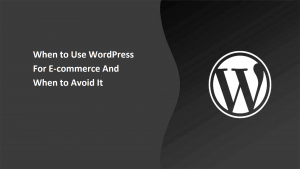
When to Use WordPress For E-commerce And When to Avoid It
We will walk you through all the details of where you should set up your online store and if WordPress E-commerce is right for you or not
- WordPress is now a decade old and is still the reigning champ for managing sites with a ton of content. If you plan on pursuing an SEO or content marketing strategy for your business, WordPress is the only legitimate choice for your site.
- WordPress is a particularly handy solution for E-commerce websites. Taking everything we previously listed into consideration, it’s surely no surprise this platform is everyone’s first pick, especially if they’re running an online store. And thanks to the free WooCommerce plugin, and all the WordPress themes compatible with WooCommerce, you can have an up-and-running online store in a matter of days, if not hours.
- Because WordPress is open source, its far-flung community of developers are constantly coming up with new plugins and themes. WordPress is made infinitely powerful with the hundreds (even thousands) of useful plugins that allow you to do whatever you want. Many of these are even free of charge.
Here are some of our favorites:
WordPress plugins for content marketing
WordPress plugins for product pages
WordPress plugins for SEO
WordPress plugins for automation
WordPress plugins for e-commerce stores
- WordPress is incredibly versatile, whether you’re a do-it-yourselfer or prefer to leave the website design to the experts. You could get your E-commerce website started for less than $100.
- A Myriad of Plugins and Themes: If you’d like to augment the functionality of your WordPress website and power the whole thing up, simply pick and install some handy plugins. Depending on what kind of website you’re running, you’ll choose the plugins that match your requirements. The WordPress plugin repository counts over 55k plugins, so there’s definitely something for everyone.
Also, with a plethora of online store WordPress themes to choose from, you can easily craft a website for your needs without being an expert.
When to Avoid WordPress E-commerce
- You don’t have a reliable developer: If you’re an E-commerce owner and you don’t have your own developer and you’re not a developer, it will be difficult to keep your WordPress E-commerce store running long-term. Although the store might be running fine after the initial setup, there are frequent updates to stay on top of.
- Complex products:WordPress E-commerce plugins like WooCommerce and Jigoshop are good for quickly adding simple products with a few variations. Creating complex and variable products, however, takes significant customization. For many WordPress E-commerce plugins, you’ll need to add in additional third-party plugins to get what you want.
- When a new version of WordPress is released with updates and security patches, you’ll want to update. In addition to keeping the WordPress core updated, you’ll also need to update the E-commerce system that you are using with WordPress. You’ll also need to update any other third party plugins that you’re using on the site and make sure those are up to date as well. Before you can actually do the upgrading, however, you’ll want to test the upgrades.
- If you’re not a developer or don’t want to pay for a developer’s time when your website’s backend needs updated, WordPress might not be the best choice. Most seasoned WordPress developers know that testing the updates before going live is crucial.




0 Comments